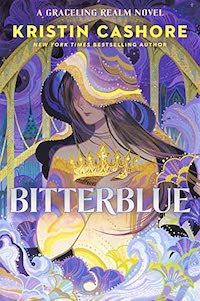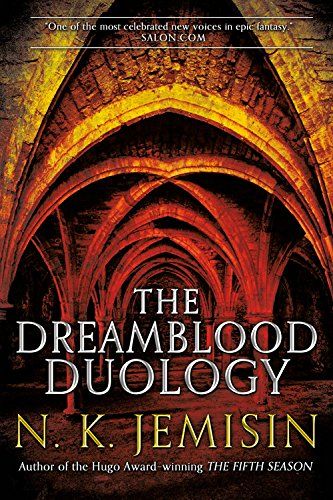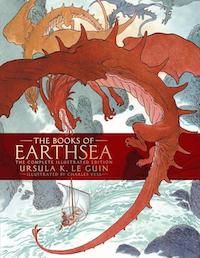A note to the unfamiliar reader: while I don’t discuss these plotpoints below, all of these books contain difficult content, including violence against women and children; I recommend seeking out content warnings before you pick them up! Bitterblue is about a young woman who has inherited a kingdom from her abusive, violent, gaslighting father, and is surrounded by traumatized advisers who bury her in paperwork and are working very hard to prevent her from examining anything that happened during her father’s reign. The relevance to our political situation — particularly when I was reading it, pre-Inauguration Day — could not have been more obvious. And yet this book was published in 2012, and when I first read it I wasn’t thinking about modern politics; I was focused instead on Bitterblue’s journey as a trauma survivor, to discover who she is as a person, a queen, a friend, a romantic partner. How not to be envious of those around her; how to remember that we’re all struggling in our own ways; how to find our feet under the weight of crushing responsibility to others. And those things, too, are still entirely relevant to me and to my life right now. Jemisin’s Dreamblood Duology was my first introduction to her work, and I am always championing it for that reason; it was the first epic fantasy I read as an adult that wasn’t based on European folklore and mythology. Not that they weren’t around — I just hadn’t picked any up yet! And this world, inspired by Egyptian mythology and filled with dream magic, assassin priests, complex gender roles, clashing cultures, and political shenanigans, is one I think about often and am always excited to revisit. This time around what resonated, like a gong sounding in my brain, were the ties that characters built across cultures and competing interests; they had their missions, they had their orders, they had their own interests, but they also saw one another’s humanity. They saw their goals were in line, they found places to connect, and they came to know each other. These are prickly, difficult people, and their friendships are prickly and difficult too, but so important to them. Getting to inhabit those relationships with them was a balm for my pandemic-isolated, struggling-to-connect soul. It doesn’t have to be easy, it doesn’t have to be perfect. You just have to reach out from time to time. And then, of course, there was Earthsea. While this wasn’t my first time rereading the books, it was the first time I’d ever gone through them start to finish, thanks to the gorgeous collected volume illustrated by Charles Vess. It was the first time I got to see the characters as Le Guin intended them, in all the glory of their different skin tones, with their goats and their hawks and their animal familiars. And this time it was Tenar’s journey that had me catching my breath and turning the pages. From priestess to cruel gods, to farm wife and mother and widow, to advisor to royalty and mentor to exceptional young women, and then to retire quietly to keep her own house with her beloved. I can’t even type about it with getting choked up! As I near 40 and look back on the dramatic life changes I’ve undergone and milestones I’ve hit (still working on that advisor to royalty bit, FYI), I felt as if I were walking side by side with her and comparing notes. It was deeply settling to remember that life is cyclical; that things come and things go, and though your role may change you’re still you. I’m still me. I don’t know what will be going on, who will be in my life and who will be out of it, what role I’ll be inhabiting next time I pick these books up. But I do know that there will be something there for Future Me, just as there has been for Past and Present. There are lots of reasons to reread books, from reminding yourself that you don’t have to feel guilty to releasing yourself from the compulsion of your TBR. Heck, one of our contributors even took a poll to find out people’s reasons!


